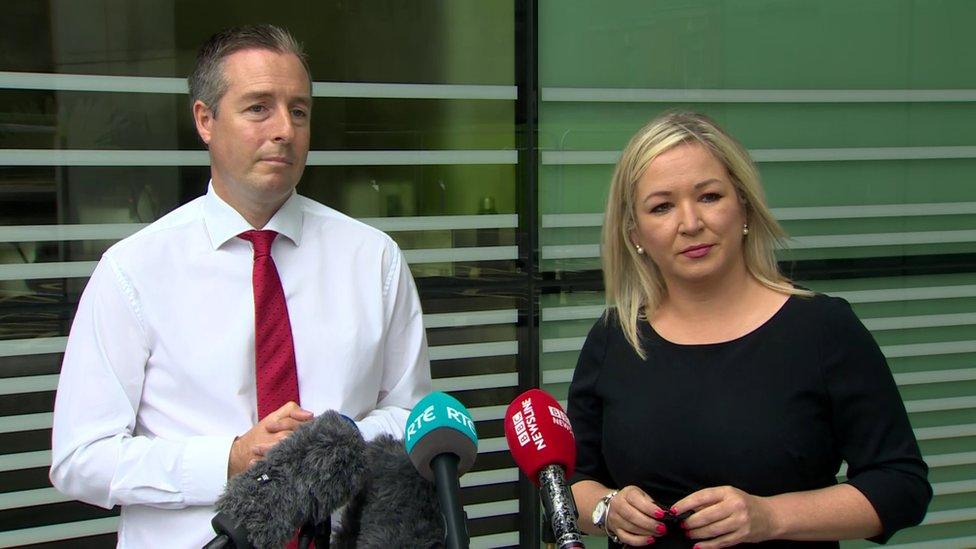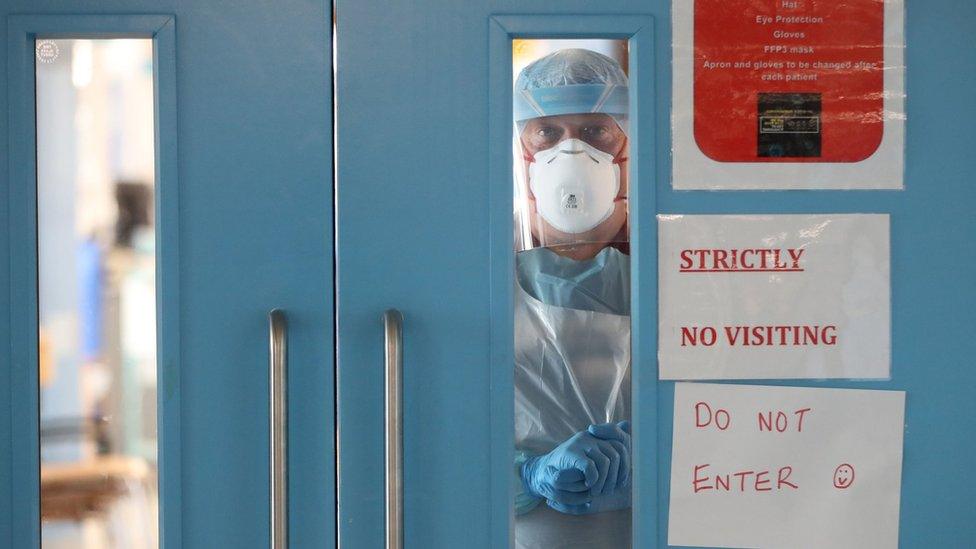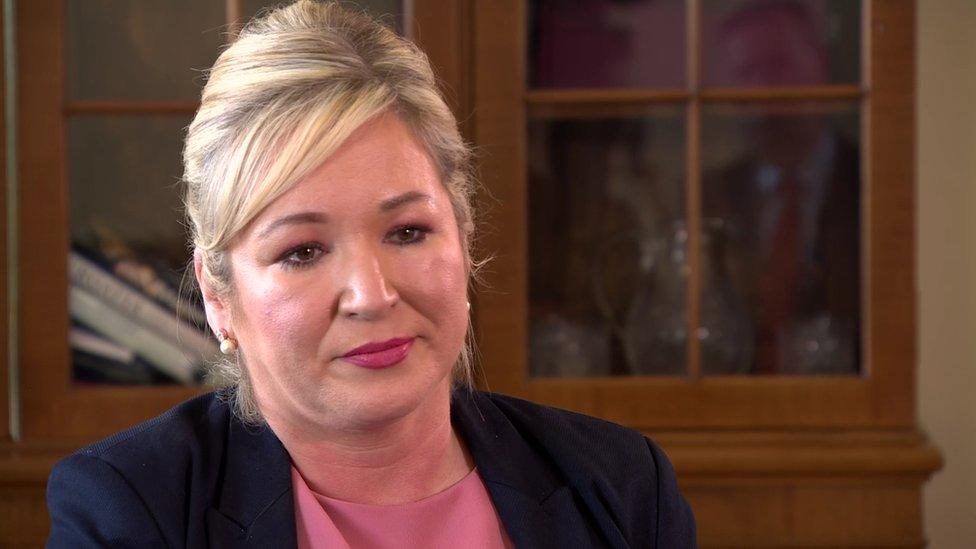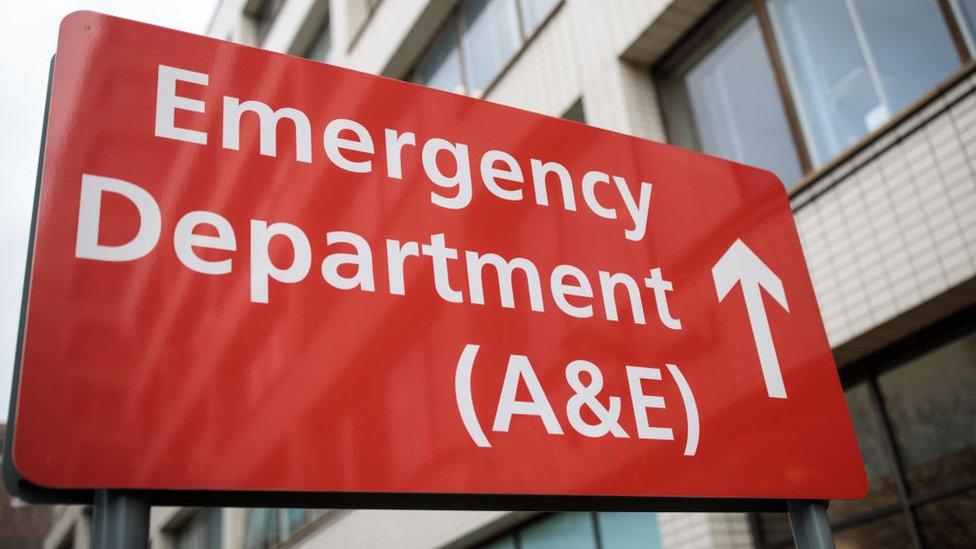Covid-19: NI health service 'will topple over' without action
- Published
- comments

The first and deputy first ministers visited the Royal Victoria Hospital in Belfast
Northern Ireland's health service is "about to topple over" if immediate action is not taken, the deputy first minister has said.
Michelle O'Neill said staff were "facing into a very difficult winter" under current pressures.
She met staff at the Royal Victoria Hospital in Belfast on Tuesday along with First Minister Paul Givan.
They both said they wanted to avoid any further lockdowns or "circuit breakers".
Deputy First Minister Michelle O'Neill says Northern Ireland health staff "are begging for support".
Sinn Féin vice-president Ms O'Neill said the healthcare system was facing increased staff absences with workers feeling "burnt out".
"They're begging for our support. They are physically and mentally exhausted," she said.
Mr Givan of the Democratic Unionist Party (DUP) said the Northern Ireland Executive would take a "measured approach" when ministers meet on Thursday to discuss future Covid-19 plans.
He said ministers would take into consideration the current transmission rates and hospitalisation.
Covid-19: Paul Givan says there needs to be 'balanced decisions'
He said politicians needed to be honest with people "about the realities in what we're facing".
He added that he was concerned about other issues linked to lockdowns, saying: "People are presenting with severe mental health issues as a result of the lockdown and delayed treatments and some couldn't access services."
Mr Givan said healthcare staff were working "more hours than they've worked before" and there was "a need for us all to take the personal responsibility very seriously, whether that's through regulation or through guidance".

Michelle O'Neill said health staff were feeling burnt out due to pressures on the system
Ms O'Neill said she "would not rule out anything" and would "keep everything on the table - it's the prudent and honest way to proceed".
"We need a very cautious approach in the time ahead."
She added that Health Minister Robin Swann would bring forward a winter surge plan for the health service in due course and that further details for how the executive would respond to winter pressures should be announced on Thursday afternoon.
Compulsory vaccinations for NI?
From the 11 of November, anyone working or volunteering in a care home in England will need to be fully vaccinated against coronavirus, unless they are exempt.
There is also a consultation on whether it should be made mandatory for all frontline workers in health and care settings.
Visiting professor of public health at Bristol University, Gabriel Scally, said while he did not like the thought of compulsory vaccinations there was a "particular duty of care" in health care settings.
"People in hospitals or care homes are already ill and the burden of infectious disease really can be avoided largely by vaccination so I think I am in favour of it," he told BBC News NI's Talkback programme.
But professor of social policy at Ulster University, Deirdre Heenan, told the programme she was opposed to vaccines becoming compulsory for health and social care staff in Northern Ireland.
"We have to take account of the needs of health care workers and it's important to see both sides," she told Talkback.
"When we are talking about social care workers I'm not comfortable with forcing people to have vaccinations, in fact scapegoating the lowest paid part of the social care workforce, often young women who have real issue about vaccination," she said.
"I would rather we have a programme of talking to people and understanding why people are vaccine hesitant."
Five more deaths and 1,020 cases of coronavirus were reported on Northern Ireland on Monday.
There were 379 patients with Covid-19 in hospitals on Monday, compared to 419 on Friday.
There were 33 patients with Covid-19 in hospital intensive care units on Monday, down from 38 on Friday.
Related topics
- Published20 September 2021

- Published30 August 2021
